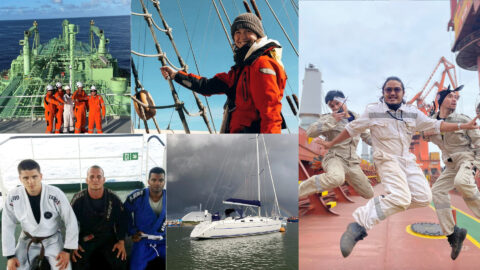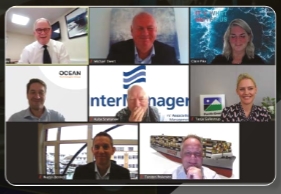Two prominent industry figures take part in Q&A session over information technology, shale revolution and emission control areas
Lloyd’s List has invited International Chamber of Shipping chairman Masamichi Morooka and InterManager President Gerardo Borromeo — two prominent industry figures who will speak in the CMA’s opening session — to share their views on information technology, the shale revolution and emission control areas.
Is the low oil price and US shale revolution all good for shipping companies? Are there any caveats?
Mr Morooka: Shipping companies not only transport oil and gas but also depend upon them as fuel. The US shale gas revolution has brought the shipping industry new opportunities to transport liquefied natural gas from the US to customers worldwide.
However, the revolution has also created price competition between oil and gas; it is well known that the oil price has dropped sharply but nobody can predict the future price level.
The dramatic fall in the oil price has made the oil tanker (including very large crude carriers) market buoyant, which is very welcome. But conversely, future LNG projects are now subject to review due to the same oil price fall.
These difficult market conditions may negatively impact future demand for LNG tankers, but it is premature to conclude any future forecast, since there is no guarantee that the oil price will stabilise at the present level.
The sharp drop in bunker price has created a benefit for the shipping industry, albeit possibly a short-term benefit. As time goes by, the freight rate will be adjusted downward and will therefore offset the benefit. Needless to say, the shipping industry welcomes the current bunker price and hopes that it will be maintained.
LNG as fuel is another subject and the shale gas revolution has raised confidence within the industry on the sustainability of future LNG fuel supply. The current situation will help the shipping industry to promote LNG as a fuel option for ships in future.
How do you see the new emission control area rules affect shipping companies, especially in North America? What could regulators do to help ship operators follow the rules while achieving the stated goal of reducing emissions?
Mr Morooka: Ship operators who pay the bill for expensive marine gasoil in the ECA are, of course, pleased to see the current fall in the bunker price but we have very serious concerns about the availability of low-sulphur fuel from oil refineries in future.
The International Maritime Organization is required to complete an availability study by 2018 but this is very late to meet the expected 2020 compliance date, which gives a feeling of brinkmanship over compliance on the global scale.
Governments must engage in discussion with their refining industry to help the IMO develop a valid picture of fuel availability without any further delay. There is a pressing need in the refining and the shipping sectors to establish that the market demand will be met satisfactorily from both availability and price perspectives.
How can the more advanced IT of modern times help improve efficiency in shipmanagement?
Mr Borromeo: Our philosophy towards shipmanagement revolves around the importance of understanding, developing and managing three key elements: people, processes and technology. The effective management of these elements plays an important role in driving overall efficiency, both on board and on shore.
The continuous development of our maritime professionals is paramount in our overall strategy. Through continuous learning, we aim to ensure that our maritime professionals evolve the skillsets necessary to be both quality leaders and professionals. Part of the continuing development effort requires a thorough understanding of the processes used in the management systems employed by shipmanagers and crew managers.
Complementing the development of our people and the enhancement of processes is the injection and implementation of appropriate technologies across all working systems. Whether technology is provided through hardware or software, the idea is to leverage on what technology can do to drive overall efficiency.
Here is where automation comes in very handy. The use of automation, particularly to supplement manual tasks, means that our professionals on board can be freed up to do more effective thinking and analysis of their work — key components in improving management and efficiency.
Complementing automation is enhanced reliance on communication, particularly ship-to-shore voice and data exchange. As the cost of bandwidth comes down and the availability of broadband globally is ensured, a natural evolution into real-time or almost real-time equipment monitoring can be done both on board and on shore.
The result is big data and data mining processes taking root and driving the availability of critical information that is helpful in navigation, equipment monitoring and maintenance, cargo handling and cargo monitoring, and even crew care, to name a few activities that will benefit from advances in information technology and communications.
Such connectivity will not only benefit management and operating processes, but having cost-effective communication systems on board will bring crew and their families closer together. The idea of being able to offer the same virtual experience enjoyed by land-based families (who may be physically separated geographically but remain “in touch”) to crew members and their distantly situated families ashore, is priceless. A happy crew means a more productive crew, who can then focus on their work, resulting in a quality, safe and secure work environment.
How do you see the new ECA rules affecting shipping companies? What could regulators do to help shipping firms follow the rules while achieving the stated goal of reducing emissions, from a shipmanager’s point of view?
Mr Borromeo: Shipping is perhaps the most regulated industry globally. In spite of this, the shipping industry has done many things to lead the way in operating, with the highest levels of efficiency possible, while keeping corporate social responsibility at the top of its agenda.
Shipping serves as the backbone of global trade and accepts its responsibilities with the end in view of getting things done, through consistent performance.
An area that often poses challenges to promoting consistent performance within the shipping industry is the manner in which national and international regulations are created.
In numerous cases, well-intended regulations often come with unintended consequences, resulting in less than desirable or equitable results.
The costs associated with regulations that may not fully appreciate the impact of unintended consequences end up creating inefficiencies that ultimately negate the original purpose for which they were intended.
The creation of ECAs proffers potential good for the general public. ECAs mandate the use of certain fuel types in order to limit and control emissions related to shipping operations around its zones.
However, because of the type of fuel required, which costs more to use, this will result in transport by sea becoming more expensive.
An unintended consequence of this is that potentially much more cargo, which would normally pass by sea, is instead being re-routed by land. This results in a less-than-optimal transport of goods because of scale, and translates to more congested roads, more traffic and effectively more pollution generated on land.
Such examples suggest that a more engaged dialogue among the various stakeholders, which should include the shipping community, could help to minimise unintended consequences. Engaged and regular discussion can result in the development of more effective regulations that ultimately achieve their goals and will find full support from the various constituencies.
* Mr Morooka is also NYK Bulk & Projects Carriers’ president and chief executive.
* Mr Borromeo is also Philippines Transmarine Carriers’ vice-chairman and chief executive.
For more CMA coverage or maritime news see Lloyd’s List


